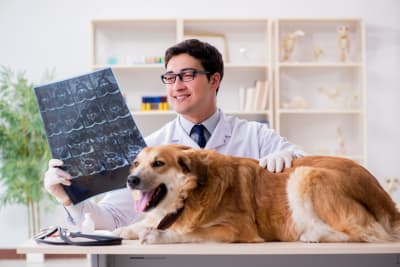Diagnostic imaging for dogs
Diagnostic imaging, like computerized tomography (CT), plays an essential role in the diagnosis and treatment of diseases in human and veterinary medicine. The advancements made in technology over the years have aided doctors in diagnosing and treating various conditions that they may not have been able to treat before. As in human hospitals, a CT scanner is an essential diagnostic tool for veterinarians.
What is a CT scan?
A CT scan creates a detailed still image of your animal's organs, bones, and tissues. CT scans take only minutes to perform — making them great for emergencies — and do so by passing X-rays through the body to create images. A CT scan will show signs of a problem after the disease has begun to change the structure of the tissues or organs. After a CT scan, there is no radiation remaining in your pet's body.
How does a CT machine work?
CT works by producing multiple individual images — sometimes called 'slices' — of the region of interest via X-rays and a computer. A common comparison to an image produced by a CT scanner is individual slices of bread that make up a complete loaf. The CT machine produces 2D slices of a section of your dog's anatomy and then reconfigures them into a complete image we can view.
These slices can also be used to create 3D reconstructions, which can be very useful for things like surgical planning. Once the images are produced, they are sent to your vet or a veterinary specialist to review and interpret.
Why do dogs need CT scans?
The most common reason your vet may recommend a CT scan for your dog is if they suspect there is a problem and they need a clearer picture of what it is. A CT scan, with its detailed image of your dog's interior, allows your vet to better diagnose potential issues and quickly administer the appropriate treatment plan.
How are CT scans for dogs beneficial?
The high-resolution images produced by a CT scanner help vets evaluate your dog's anatomy in greater detail than traditional X-rays allow.
CT scanners provide excellent, detailed scans of bony and soft tissue structures in the body. The most common areas of the body scanned by vets using CT technology include your dog's spine, nasal cavity, inner ear, and chest or lungs. Vets may also use CT technology to assess your pet's lymph nodes, thyroid gland, abdominal organs, skull/brain, and vascular structures.
A CT scan can also be combined with a contrast agent that is given to your dog intravenously (IV), allowing your vet to see increased areas of blood flow in the body. This is a great way to detect cancer and areas of inflammation.
What to expect when your dog has a CT scan
Your vet will likely instruct you to avoid feeding your dog the night before the scan to get the clearest possible image. Additionally, the dog needs to be completely still while the scan is taking place. In human medicine, simply telling the patient to not move and to occasionally hold their breath is sufficient; since this is not possible with dogs, heavy sedation or general anesthesia is required.
Your dog's vital signs are closely monitored while under anesthesia throughout the CT. The CT scanners are very efficient, and a typical CT scan only takes a short time.
Following the CT for your dog, your vet or veterinary specialist will interpret the images and provide you with an accurate diagnosis of your dog's condition along with recommendations regarding the best course of treatment for your pet.
Note: The advice provided in this post is intended for informational purposes and does not constitute medical advice regarding pets. For an accurate diagnosis of your pet's condition, please make an appointment with your vet.
 Looking for a vet in South Wilton?
Looking for a vet in South Wilton?
We're always accepting new patients, so contact our veterinary hospital today to book your pet's first appointment.
Related Articles View All
C-Section for Dogs: Everything You Should Know
Our South Wilton vets share some information about c-sections in dogs, when they might be needed, and what you can expect.
Enucleation: Eye Removal in Cats & Dogs
Learning that your cat or dog needs eye removal surgery can be upsetting, and you'll probably have many questions. Our veterinarians in South Wilton explain pet eye removal, recovery times, potential complications, and more.
Why does my pet need a urinalysis?
Your vet can perform a urinalysis to determine whether your cat or dog may have a health condition or disease that needs treatment. Here, our South Wilton veterinarians explain why regular urinalysis testing for pets is a critical part of their care.
Understanding Blood Tests for Dogs
Dogs and cats often require diagnostic blood tests to reveal vital health information about underlying health conditions. In this post, our veterinarians at South Wilton explain the significance of these tests for pets.

